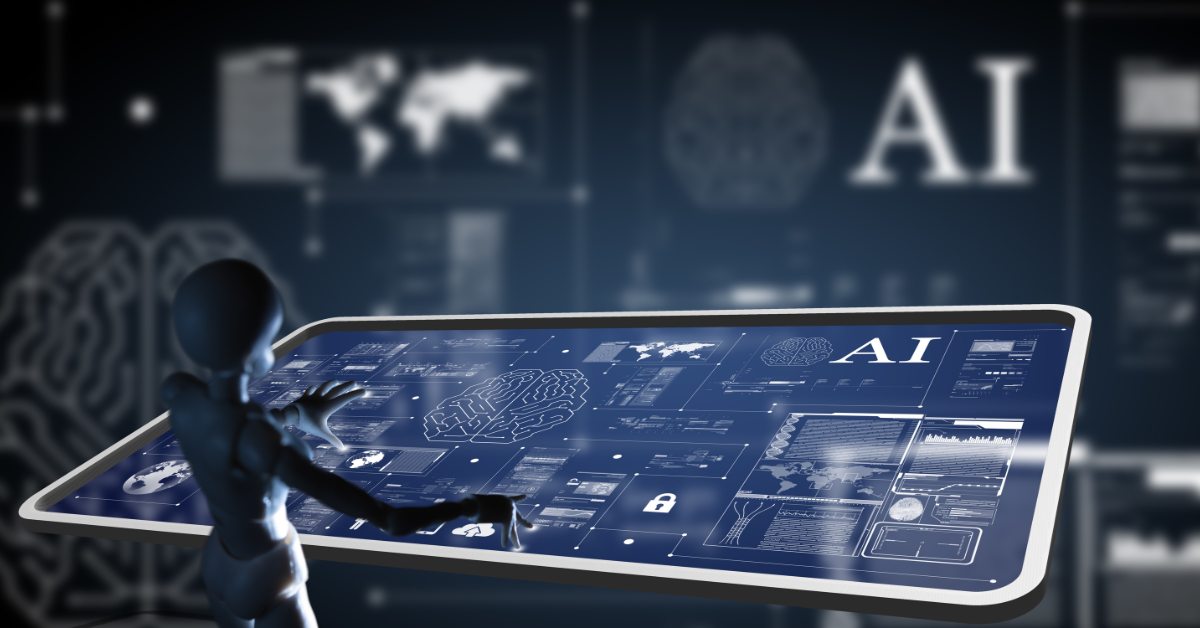6 Key Areas Where AI-Powered Automation is Making a Significant Impact

- 6 Key Areas of AI-Powered Business Automation
- What are the Best Practices for Implementing AI-Powered Automation?
- Case Studies: Real-World Examples of Successful Products Using AI-Powered Automation
- Overcoming Challenges in Adopting AI Automation
- What is the Future of AI Automation?
- Upskill and Excel in the World of AI and ML With Emeritus
Artificial Intelligence (AI) has been positively impacting businesses by automating jobs at a steady pace. At the speed that it is growing, AI is expected to contribute a significant 21% net increase to the U.S. GDP by 2030, showcasing its impact on economic growth. AI-powered automation has been disrupting industries over the years. From revolutionizing customer service to empowering data-driven decision-making, streamlining supply chain management, to fortifying cybersecurity, the possibilities of AI-powered automation are limitless. Let’s, therefore, delve into the world of AI automation and analyze how it can ignite a future of boundless potential and unparalleled success.
6 Key Areas of AI-Powered Business Automation
 Some of the key areas where AI is making a significant impact include the following:
Some of the key areas where AI is making a significant impact include the following:
1. Customer Service Transformation
AI-powered automation, with its chatbots and virtual assistants, has revolutionized customer service. Firstly, it enables businesses to deliver prompt and personalized responses. Additionally, it ensures seamless interactions, eliminating the need for long waiting periods or frustrating call transfers.
2. Data Analysis Advancements
With AI-powered automation, data analysis has reached new heights of efficiency and accuracy. By employing advanced algorithms, businesses can swiftly process large volumes of data, extract meaningful insights, and drive data-driven decision-making.
3. Supply Chain Optimization
Automation optimizes supply chain management processes by streamlining inventory management, demand forecasting, and logistics. Consequently, businesses experience enhanced operational efficiency, minimized costs, and improved customer satisfaction through timely deliveries.
4. Streamlined Task Execution
Repetitive and time-consuming tasks are now efficiently automated with the help of AI. Furthermore, by delegating mundane activities to AI algorithms, businesses can empower their workforce to focus on more strategic and creative endeavors, boosting overall productivity and job satisfaction.
5. Reinforced Cybersecurity
AI-powered automation strengthens cybersecurity defenses. It identifies potential threats, detects anomalies, and responds rapidly to security breaches. Furthermore, this proactive approach ensures robust protection of sensitive data and safeguards businesses from evolving cyber risks.
6. Personalized Marketing Success
Automation also enables businesses to deliver personalized marketing experiences. It analyzes customer preferences and behaviors through sophisticated algorithms, allowing targeted advertisements and personalized recommendations. Ultimately, this increases customer engagement, conversion rates, and overall marketing effectiveness.
ALSO READ: Mastering the Basics: A Step-by-Step Guide to Understanding Machine Learning
What are the Best Practices for Implementing AI-Powered Automation?
Here are the eight best practices for implementing AI-powered automation:
1. Set Clear Objectives
Define specific goals such as increasing efficiency, driving revenue growth, improving customer acquisition, or enhancing personalization.
2. Conduct Thorough Data Analysis
Analyze existing data to identify areas where AI-powered automation can significantly impact decision-making and business growth.
3. Start Small and Scale
Begin with pilot projects or use cases to test the effectiveness of AI-powered automation before implementing it on a larger scale.
4. Choose the Right AI Technology
Select AI-powered automation solutions that align with your business requirements, ensuring they have a proven track record through case studies and testimonials.
5. Train and Upskill Employees
Provide training to employees to ensure they understand how to leverage AI-powered automation tools effectively and maximize their benefits.
6. Address Challenges Proactively
Anticipate challenges such as data privacy, ethical considerations, and employee resistance, and develop strategies to overcome them.
7. Monitor and Optimize Performance
Continuously monitor the performance of AI-powered automation systems, making necessary adjustments to improve efficiency, customer retention, and revenue increase.
8. Stay Abreast of Future Trends
Stay updated on emerging technologies and trends in AI-powered automation to ensure you are well-positioned to adapt and stay ahead of the competition.
ALSO READ: Is There a Demand for AI Engineers? Can You Make It a Successful Career?
Case Studies: Real-World Examples of Successful Products Using AI-Powered Automation
Tesla: AI Automation in Autonomous Vehicles
A renowned electric vehicle manufacturer, Tesla has successfully integrated AI-powered automation into its autonomous driving systems. With the help of advanced AI algorithms, Tesla vehicles effectively utilize sensors, cameras, and real-time data processing to make intelligent decisions on the road. Moreover, AI-powered automation enables features like Autopilot, which seamlessly assists drivers with tasks such as lane-keeping, adaptive cruise control, and self-parking. By harnessing the power of AI, Tesla has significantly advanced the field of autonomous driving.
Furthermore, through continuous data collection and analysis, its vehicles constantly learn and improve their driving capabilities. This ongoing automation not only enhances safety and convenience for Tesla drivers but also contributes to the broader goal of achieving fully self-driving vehicles. Consequently, Tesla’s implementation of AI-powered automation has positioned it as a leader in the electric vehicle industry, effectively showcasing the immense potential of AI in revolutionizing transportation.
Meta: AI Automation in Content Moderation
Meta Platforms Inc., formerly Facebook Inc., has strategically leveraged AI-powered automation to tackle the challenging task of content moderation. With billions of pieces of user-generated content being shared daily, Meta proactively implements AI algorithms to automatically detect and filter out hate speech, violence, and graphic imagery. This automation facilitates the quick identification and removal of problematic content, thereby creating a safer and more user-friendly online environment.
Consequently, Meta’s insightful implementation of AI-powered automation in content moderation not only showcases the remarkable potential of AI but also serves as a testament to its commitment to protecting users, maintaining platform integrity, and upholding community standards.
ALSO READ: Mastering ChatGPT Prompts: The 5 Best Ways to Write These Prompts
Overcoming Challenges in Adopting AI Automation
Here are five main challenges businesses face when adopting AI automation:
1. Limited Data Accessibility
To implement AI-powered automation successfully, businesses must address the challenge of limited data accessibility. This can be overcome by implementing data collection mechanisms and establishing partnerships to acquire relevant data.
2. Technical Expertise
Developing and implementing AI-powered automation requires specialized technical expertise. Companies can overcome this challenge by investing in talent acquisition, training programs, and collaborations with AI experts.
3. Ethical Considerations
Businesses adopting AI-powered automation must navigate ethical challenges such as bias, privacy, and transparency. These concerns can be addressed by implementing robust ethical frameworks, conducting audits, and ensuring transparency.
4. Integration Complexity
Integrating AI-powered automation into existing systems can be complex. However, businesses can effectively overcome integration challenges by planning well, investing in scalable infrastructure, and conducting thorough testing.
5. Change Management
Adopting AI-powered automation requires managing organizational changes and employee concerns. Effective change management strategies, clear communication, and employee training can facilitate a smooth transition.
What is the Future of AI Automation?
 The future of AI-powered automation holds tremendous promise for business growth and transformation. Firstly, AI-powered automation will continue revolutionizing various industries, enhancing operational efficiency, reducing costs, and improving customer experiences. Moreover, AI-powered automation will facilitate data-driven decision-making, providing businesses with valuable insights to drive innovation and gain a competitive advantage.
The future of AI-powered automation holds tremendous promise for business growth and transformation. Firstly, AI-powered automation will continue revolutionizing various industries, enhancing operational efficiency, reducing costs, and improving customer experiences. Moreover, AI-powered automation will facilitate data-driven decision-making, providing businesses with valuable insights to drive innovation and gain a competitive advantage.
Additionally, AI-powered automation enables personalized marketing strategies, targeting individual customer preferences and driving customer acquisition and retention. Furthermore, as AI technology advances, we can expect increased collaboration between humans and machines, with AI-powered automation augmenting human capabilities and driving further productivity gains.
Upskill and Excel in the World of AI and ML With Emeritus
The transformative power of AI-powered automation is fundamentally reshaping the way businesses operate across various domains. From customer service to supply chain management, data analysis to marketing, AI is catalyzing significant advancements in business operations. Looking ahead, the relentless advancements in AI technology will further amplify its impact on business growth and innovation. Therefore, to thrive in this dynamic landscape, you must embrace AI’s boundless potential. Start by exploring Emeritus’ machine learning courses and artificial intelligence courses and embark on a transformative journey toward a brighter and more prosperous future.
Write to us at content@emeritus.org






